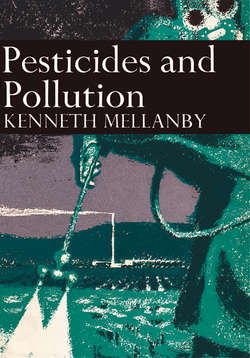Читать книгу Pesticides and Pollution - Kenneth Mellanby - Страница 5
AUTHOR’S PREFACE
ОглавлениеIn this book I have tried to deal with the subject of environmental pollution in Britain in an objective way. The public, and particularly those members of the public who are interested in the conservation of wild life, are very familiar with many types of pollution, but they cannot always judge their importance. Sometimes atomic radiation seems to be all-important, particularly when questions of military strategy are discussed. Our many fishless rivers are clear evidence of the serious effects of the pollution of fresh water, and every year our newspapers have pictures of dead seabirds covered with oil on our beaches. Great publicity has been given to agricultural chemicals. The remarkable impact of Rachel Carson’s Silent Spring has suggested that insecticides are the greatest danger. I have deliberately avoided dealing with this book in the text, not because I underrate its contribution to the subject, but because I think that the time has come to try to look at all sides of the problem. Rachel Carson, when dealing with insecticides and herbicides, was careful to give us the facts as they applied to the United States, but she selected her facts, and gave us an advocate’s case. At the time, this was a useful service to science, and equally selective rejoinders from the chemical industry have done little to reassure the public. Other and more objective books on the effects of pesticides are listed in the bibliography. One of my main tasks has been to try to fit pesticides into the general picture of pollution from all sources.
The writer of a book like this needs to call on many others for help. Over a good many years I have discussed these problems with scientists from many countries, and I have tried to digest their views and the contents of their publications. The question of pesticides must have special mention. I have been fortunate in being able to discuss these problems with Dr. N. W. Moore, head of the Nature Conservancy’s Toxic Chemicals and Wild Life Section at Monks Wood Experimental Station, and with the members of his team. Dr. Moore was the first scientist in Britain to organise research work on this subject, and he and his colleagues have made major contributions towards the understanding of their problem. I have received immense help from them at all stages and have taken up a great deal of their time in detailed discussion. I hasten to add, however, that they are in no way to blame for any faults in my presentation of the subject.
The editors of this series have given valuable help. Sir Julian Huxley originally suggested that I should write this book, and made useful proposals as to its contents. Sir Dudley Stamp also gave me much encouragement, and the most courteous application of the spur whenever I fell behind my schedule. Without this I would never have finished the book. He read the manuscript and I shall treasure the appreciative letter he wrote me about it not long before his untimely death.
As I have already said, I have tried to make this book an objective account of pollution. I fear that I shall be attacked from all sides. In discussions I have been accused of exaggerating the dangerous effects of industrial processes and of beneficial agricultural chemicals. I have also been told that I play down the dangers of these substances. So long as the attacks do indeed come from these different quarters I shall not feel that I have entirely failed in my objective.
